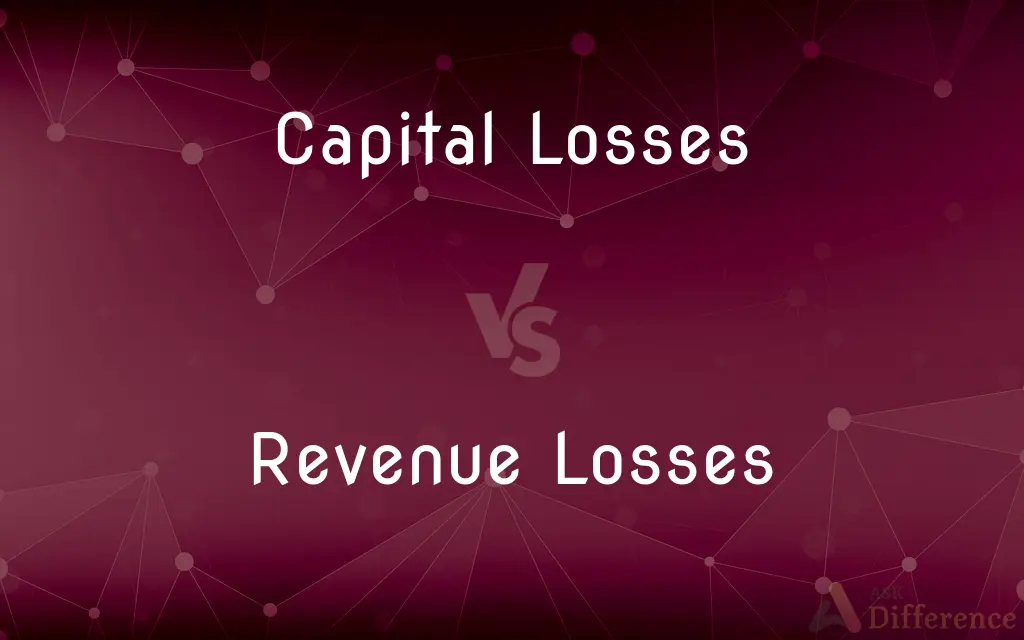Capital Losses vs. Revenue Losses — What's the Difference?
By Tayyaba Rehman — Published on October 17, 2023
Capital Losses occur when assets are sold for less than their purchase price; Revenue Losses arise when a business’s revenues do not cover the costs incurred in earning them.

Difference Between Capital Losses and Revenue Losses
Table of Contents
ADVERTISEMENT
Key Differences
Capital Losses and Revenue Losses are distinct financial concepts with Capital Losses primarily referring to the loss incurred when an asset, often an investment or real estate, is sold for a price lower than its purchase price. This is typically associated with investments and is realized when assets are actually sold. On the other hand, Revenue Losses are experienced when the total revenues of a business are less than the total expenses incurred in the process of generating those revenues, impacting the operational profitability of a business.
In the context of Capital Losses, the emphasis is predominantly on the reduction in the value of specific assets. This can occur due to various reasons such as market fluctuations, reduced demand, or external economic factors. It represents a decline in the value of investment assets. Conversely, Revenue Losses are not tied to asset depreciation but are related to the inefficiencies or external conditions impacting the normal operating revenues of a business, such as decreased sales, increased competition, or unfavorable market conditions.
Capital Losses, being contingent on the sale of assets, are more sporadic and are often not recurrent unless it involves a series of unfavorable investment decisions. These losses directly impact the value of the assets on the balance sheet. Revenue Losses, however, may be recurrent and often signify underlying issues in the company’s operations or market strategy. They affect the income statement, reflecting the business’s inability to generate sufficient revenues to cover expenses.
While Capital Losses impact the investment portfolio of an individual or an entity and can be used to offset capital gains for tax purposes, Revenue Losses imply a more immediate and direct effect on the operational aspect of the business and its overall financial health. Addressing Revenue Losses may involve strategic changes in operations, pricing, or product offerings, while mitigating Capital Losses may involve reassessment and adjustment of investment strategies.
Finally, understanding the dynamics of Capital Losses is crucial for effective investment management and financial planning, particularly for individuals and entities engaged in buying and selling assets. Understanding Revenue Losses, however, is pivotal for business survival and growth as it directly relates to the business’s ability to sustain operations and achieve profitability.
ADVERTISEMENT
Comparison Chart
Nature
Loss on the sale of an asset.
Operational loss due to revenues not covering costs.
Occurrence
Sporadic and tied to asset sale.
Can be recurrent, related to business operations.
Impact Area
Affects the value of assets.
Affects operational profitability.
Relevance
Important for investment management and financial planning.
Critical for business survival and growth.
Mitigation
Reassessment and adjustment of investment strategies.
Strategic changes in operations, pricing, or offerings.
Compare with Definitions
Capital Losses
Capital Losses are realized when assets are actually sold.
Despite the decreased value, no Capital Losses were incurred until the assets were sold.
Revenue Losses
Revenue Losses reflect the business’s inability to generate sufficient revenues.
The company needed to address the underlying causes of its Revenue Losses promptly.
Capital Losses
Capital Losses impact the investment portfolio’s value.
Proper management is essential to minimize Capital Losses in the investment portfolio.
Revenue Losses
Revenue Losses signify issues in a company’s operations or market strategy.
Continuous Revenue Losses prompted a reassessment of the company's business strategy.
Capital Losses
Capital Losses can be used to offset capital gains for tax purposes.
The investor used Capital Losses to reduce the taxable amount on capital gains.
Revenue Losses
Revenue Losses arise when business revenues do not cover operational costs.
The decline in sales led to substantial Revenue Losses for the company.
Capital Losses
Capital Losses occur when an asset is sold for less than its purchase price.
Selling the investment at a lower value resulted in Capital Losses for the investor.
Revenue Losses
Revenue Losses may require strategic changes in operations or product offerings.
To curb the Revenue Losses, the company introduced new product lines.
Capital Losses
Capital Losses represent a decline in the value of investment assets.
The market downturn led to significant Capital Losses in the portfolio.
Revenue Losses
Revenue Losses impact a business’s operational profitability.
Persistent Revenue Losses can jeopardize the financial stability of a business.
Common Curiosities
How are Revenue Losses realized?
They are realized through reductions in the income generated from normal business activities over time.
What are Capital Losses?
They are losses incurred when a capital asset is sold for less than its purchase price.
Are Capital Losses important for tax calculations?
Yes, they are crucial as they can offset capital gains and reduce tax liabilities.
What are Revenue Losses?
They represent the loss in income from the regular business activities or operations.
How do Capital Losses occur?
They occur when assets like investments or real estate are sold for less than their acquisition cost.
Do Capital Losses have implications for individuals and businesses alike?
Yes, both individuals and businesses need to manage Capital Losses for optimal financial outcomes and tax efficiency.
Why are Revenue Losses critical to businesses?
They impact the profitability and financial health of a business, affecting its sustainability and growth.
Can Capital Losses be managed strategically?
Yes, strategic asset management and investment decisions can help in minimizing Capital Losses.
Can Capital Losses impact investment portfolios?
Absolutely, they represent the devaluation of assets and affect the overall value of investment portfolios.
How do Revenue Losses affect a company’s bottom line?
They reduce the net income of a company, directly impacting its profitability and bottom line.
Can Capital Losses be offset for tax purposes?
Yes, they can often be used to offset capital gains, reducing the overall tax burden.
How can Revenue Losses be mitigated?
Through effective business strategies, financial management, and continuous monitoring of business operations.
Are Revenue Losses recurrent?
Yes, they can occur recurrently and impact the routine income of a business.
Are Revenue Losses indicative of business performance?
Absolutely, they reflect the operational and financial performance of a business.
Share Your Discovery

Previous Comparison
Sole Proprietorship vs. Partnership
Next Comparison
Bounteous vs. BountifulAuthor Spotlight
Written by
Tayyaba RehmanTayyaba Rehman is a distinguished writer, currently serving as a primary contributor to askdifference.com. As a researcher in semantics and etymology, Tayyaba's passion for the complexity of languages and their distinctions has found a perfect home on the platform. Tayyaba delves into the intricacies of language, distinguishing between commonly confused words and phrases, thereby providing clarity for readers worldwide.
















































